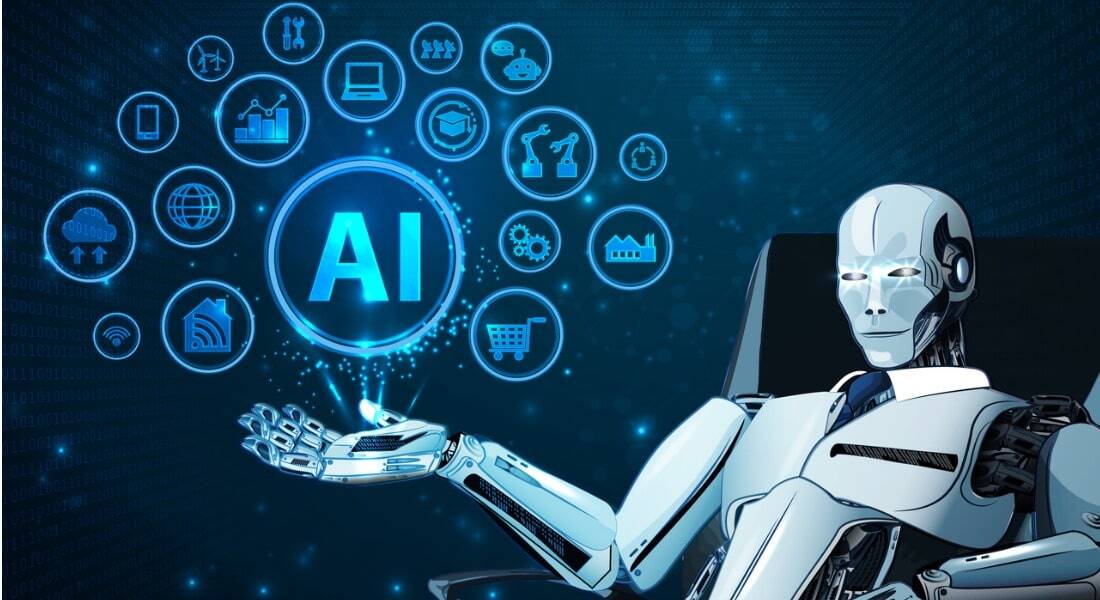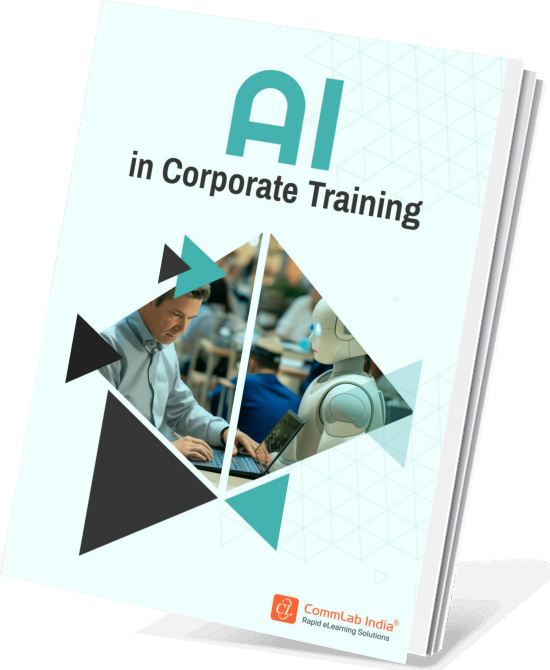AI in Corporate Training – What Training Managers Must Know to Get Started

In today's rapidly evolving business landscape, where skills and knowledge are paramount to success, corporate training is undergoing a profound transformation. The traditional methods of classroom-based lectures and standardized training programs are struggling to keep pace with the dynamic nature of work and the diverse learning needs of employees. So, here we have Artificial Intelligence (AI), a technological marvel that has the potential to revolutionize the way organizations approach corporate training. AI, with its ability to process vast amounts of data, automate tasks, and provide intelligent insights, offers a promising solution to the challenges faced by training managers. This blog post aims to provide training managers with a comprehensive understanding of AI and its applications in corporate training.
→ Download eBook Now: AI in Corporate Training
Table of Contents
- What is AI?
- What are the Key AI Technologies and Tools for Corporate Training?
- How to Implement AI in Corporate Training?
- What is the Future of AI in Corporate Training?
The challenges of engaging learners, providing personalized experiences, and measuring the effectiveness of training initiatives have become increasingly pressing for training managers. From personalized learning pathways and adaptive assessments to intelligent tutoring systems and virtual reality simulations, AI is poised to reshape the corporate training landscape. Whether you are a seasoned training professional or just beginning to explore the possibilities of AI, this blog will equip you with the knowledge and insights you need to harness the power of AI and create a more effective, engaging, and impactful corporate training program.
Planning to Get Started with AI for Your Corporate Training Initiatives?
Here are a few technologies and tools to keep a watch on
- Machine learning
- Natural language processing
- Computer vision
- AI-powered learning platforms and authoring tools
What is AI?
In the realm of corporate training, Artificial Intelligence (AI) can be conceptualized as the simulation of human intelligence processes by machines, particularly computer systems. These processes encompass learning (the acquisition of information and rules for using it), reasoning (using the rules to reach approximate or definite conclusions), and self-correction. AI enables machines to undertake activities usually associated with human intelligence, including visual perception, speech recognition, decision-making, and translating languages.
Within the broader field of AI, several subtypes play crucial roles in corporate training:
- Machine Learning: This subset enables systems to learn from data, identify patterns, and make predictions or decisions without explicit programming. Machine learning algorithms empower personalized learning experiences and adaptive assessments.
- Natural Language Processing (NLP): NLP focuses on the interaction between computers and human (natural) language. It underpins chatbots, virtual assistants, and content creation tools, facilitating natural language interactions and supporting language learning initiatives.
- Computer Vision: This area allows machines to comprehend and analyze visual data from the environment, including images and videos. Computer vision plays a pivotal role in analyzing learner behavior, facial expressions, and gestures, and it enhances virtual reality (VR) and augmented reality (AR) simulations.
How is AI Currently Used in Corporate Training?
The integration of AI in corporate training is already yielding tangible benefits across various applications:
- Personalized Learning Pathways: AI algorithms analyze learner data, such as performance history, preferences, and skill gaps, to create tailored learning pathways that optimize individual learning experiences.
- Adaptive Assessments: AI-powered assessments dynamically adjust the difficulty and content of questions based on the learner's performance, providing a more accurate evaluation of their knowledge and skills.
- Intelligent Tutoring Systems: These systems leverage AI to offer personalized guidance, feedback, and support to learners, mimicking the interaction with a human tutor.
- Virtual Reality and Augmented Reality Simulations: AI enhances VR and AR simulations by creating realistic and immersive environments where learners can practice skills and apply knowledge in a safe and controlled setting.

- Chatbots and Virtual Assistants: AI-powered chatbots and virtual assistants provide instant support to learners, answering questions, offering guidance, and troubleshooting issues.
- Content Creation and Curation: AI streamlines content creation by automating tasks such as generating summaries, translating text, and creating quizzes. AI-powered curation tools recommend relevant content to learners based on their interests and learning objectives.
- Data Analytics and Insights: AI analyzes learner data to generate insights into learning patterns, identify areas for improvement, and measure the effectiveness of training programs.
Benefits of Using AI in Corporate Training
The adoption of AI in corporate training promises a multitude of advantages:
- Increased Efficiency and Cost-effectiveness: AI automates administrative tasks, reduces training delivery time, and optimizes resource allocation, resulting in significant cost savings and improved operational efficiency.
- Personalized and Adaptive Learning Experiences: AI enables the creation of tailored learning pathways and adaptive assessments, catering to the unique needs and preferences of each learner, leading to enhanced engagement and improved learning outcomes.
- Improved Learner Engagement and Motivation: The interactive and immersive nature of AI-powered training solutions, such as VR simulations and gamified learning experiences, captivates learners and fosters a greater sense of motivation and achievement.
- Enhanced Learning Outcomes and Knowledge Retention: AI-driven personalization and adaptive learning promote deeper understanding and knowledge retention, empowering learners to acquire skills and apply them effectively in the workplace.
- Data-driven Decision-making and Continuous Improvement: AI provides valuable insights into learner behavior and training effectiveness, enabling training managers to make informed decisions, identify areas for improvement, and continuously optimize training programs.
Challenges and Limitations of AI in Corporate Training
While AI offers tremendous potential, it is essential to acknowledge and address its challenges and limitations:
- Data Privacy and Security Concerns: The collection and use of learner data raise concerns about privacy and security. Organizations must implement robust data protection measures and ensure compliance with relevant regulations. As mobile learning is so popular these days, here are a few ways you can ensure mobile data security.

- Algorithm Bias and Fairness: AI algorithms can perpetuate biases present in the training data, leading to unfair outcomes for certain groups of learners. It is crucial to ensure fairness and mitigate bias through careful algorithm design and ongoing monitoring.
- Initial Investment and Infrastructure Requirements: Implementing AI in corporate training may require substantial upfront investment in technology, infrastructure, and skilled personnel. Organizations must carefully evaluate the costs and benefits before embarking on AI adoption.
- The Need for Upskilling and Reskilling of the Workforce: AI integration necessitates upskilling and reskilling of the workforce, both for training managers and learners. Organizations must invest in training and development to ensure that their employees can effectively leverage AI tools and technologies.
- Balancing Human Interaction and AI-powered Automation: While AI can automate certain tasks, it is crucial to maintain a balance between human interaction and AI-powered automation. Human trainers play a vital role in providing mentorship, support, and fostering a sense of community among learners.

AI in Corporate Training
Partner, Not Replacement
- AI in Corporate Training
- AI Toolkit for Super-charged Learning
- Challenges to Consider with AI Implementation
- And More!
What are the Key AI Technologies and Tools for Corporate Training?
In this section, we will explore the key AI technologies and tools that are driving innovation in corporate training. Understanding these technologies and their applications empowers training managers to make informed decisions and select the right tools to meet their specific training needs.
Machine Learning
At the heart of AI-powered corporate training lies machine learning, a powerful technology that enables systems to learn from data and improve their performance on a specific task without being explicitly programmed. Machine learning algorithms analyze vast amounts of learner data, such as performance history, preferences, and interactions, to identify patterns and make predictions. This capability allows for the creation of personalized learning pathways and adaptive assessments, tailoring the learning experience to the unique needs of each individual.
Several popular machine learning algorithms are commonly used in corporate training:
- Decision Trees: These algorithms create a tree-like model of decisions and their possible consequences, aiding in classification and prediction tasks.
- Neural Networks: Inspired by the human brain, neural networks consist of interconnected nodes (neurons) that process information and learn from experience. They excel at complex pattern recognition and are used in various AI applications, including image and speech recognition.
- Clustering Algorithms: These algorithms group similar data points together, enabling the identification of learner segments with shared characteristics and learning preferences.
- Reinforcement Learning: This type of machine learning involves an agent interacting with an environment and learning to take actions that maximize a reward. It is particularly useful in scenario-based training sessions where learners need to make decisions and receive feedback on their actions.
Natural Language Processing (NLP)
- Natural Language Processing (NLP) is centered on the way computers interact with human language. It allows machines to comprehend, analyze, and produce human language in ways that are meaningful and practical. NLP finds various applications in corporate training, such as:
- Chatbots and Virtual Assistants: NLP powers chatbots and virtual assistants, allowing learners to interact with them using natural language. These AI-powered conversational agents can answer questions, provide guidance, and offer support, enhancing the learning experience and providing instant access to information.
- Content Creation: NLP can automate various content creation tasks, such as generating summaries, translating text, and creating quizzes. This streamlines the content development process and allows training managers to focus on more strategic initiatives.
- Language Learning: NLP plays a vital role in language learning applications, providing real-time feedback on pronunciation, grammar, and vocabulary. AI-powered language learning tools can adapt to the learner's proficiency level and offer personalized practice exercises.
Computer Vision
Computer vision enables machines to see and understand the visual world. Computer vision algorithms can analyze learners' facial expressions, gestures, and eye movements to gauge their engagement, comprehension, and emotional state. This information can be used to provide real-time feedback and adapt the learning experience accordingly. Computer vision also enhances VR and AR simulations by enabling more realistic and interactive experiences. For example, in a VR simulation of a manufacturing plant, computer vision can track the learner's hand movements and ensure that they are performing tasks correctly.
AI-powered Learning Platforms and Authoring Tools
The market offers a plethora of AI-powered learning platforms like learning experience platforms and various authoring tools that streamline the creation, delivery, and assessment of training content. These platforms leverage AI to automate various tasks, personalize learning experiences, and provide valuable insights into learner progress and performance. Some key features and benefits of these tools include:
- Adaptive Learning: AI-powered platforms can adapt the learning content and pace to the individual needs of each learner, ensuring that they are challenged but not overwhelmed.
- Personalized Recommendations: These platforms can recommend relevant content and learning resources based on the learner's interests, skills, and learning objectives.
- Automated Assessments: AI can automate the creation and grading of assessments, freeing up trainers' time and providing instant feedback to learners.
- Data Analytics and Reporting: AI-powered platforms provide detailed analytics and reports on learner progress, engagement, and performance, enabling training managers to measure the effectiveness of their programs and make data-driven decisions.
How to Implement AI in Corporate Training?
While the potential benefits of AI in corporate training are clear, the successful integration of this technology requires careful planning and execution. This section provides a step-by-step guide for training managers to effectively implement AI in their organizations.
Assess Your Training Needs and Goals
Before embarking on any AI implementation journey, it is imperative to clearly define your training needs and establish measurable goals. Conduct a thorough needs analysis to identify skill gaps, performance deficiencies, and learning preferences within your workforce. Engage with key stakeholders, including learners, trainers, and business leaders, to gather insights and understand their expectations. Set specific, measurable, achievable, relevant, and time-bound (SMART) goals to track the success of your AI initiatives.
Identify Suitable AI Technologies and Tools
Once you have a clear understanding of your training needs and goals, you can begin identifying suitable AI technologies and tools. The market offers a vast array of options, each with its unique features and capabilities. Consider the following factors when making your selection:
- Training requirements: Choose technologies and tools that align with your specific training needs, such as personalized learning, adaptive assessments, or VR simulations.
- Budget constraints: Evaluate the cost of various AI solutions and select those that fit within your budget. Keep in mind that the initial investment may be significant, but the long-term benefits can outweigh the costs.
- Vendor reputation and support: Opt for reputable vendors with a proven track record in AI and corporate training. Ensure they offer adequate training and support to facilitate a smooth implementation process.
Develop a Comprehensive Implementation Plan
A well-defined implementation plan is crucial to ensure a successful AI integration. Your plan should include the following key steps:
- Data collection and preparation: Gather relevant learner data, such as performance history, demographics, and learning preferences. Cleanse and organize the data to ensure its accuracy and compatibility with AI algorithms.
- Algorithm selection and training: Select appropriate AI algorithms based on your training needs and goals. Train the algorithms using your prepared data to ensure they can effectively personalize learning experiences and generate actionable insights.
- Integration with existing systems: Integrate AI tools and technologies with your existing learning management system (LMS) and other relevant systems to streamline data flow and create a seamless user experience.

- Pilot testing and evaluation: Conduct pilot tests with a small group of learners to evaluate the effectiveness of AI solutions and identify any potential challenges or issues. Gather feedback from learners and trainers to refine your approach before full-scale deployment.
- Deployment and monitoring: Deploy AI solutions across your organization and continuously monitor their performance. Collect data on learner engagement, knowledge retention, and overall training effectiveness. Use this data to make informed decisions and further optimize your AI initiatives.
Secure Stakeholder Buy-In and Support
Successful AI implementation hinges on securing buy-in and support from key stakeholders. Communicate the benefits of AI and its potential impact on learning outcomes and organizational performance. Address any concerns or apprehensions regarding job displacement or data privacy. Involve learners, trainers, and IT personnel throughout the implementation process to foster a sense of ownership and collaboration.
Measure and Evaluate the Impact of AI
Establish clear metrics and key performance indicators (KPIs) to measure the effectiveness of AI in your corporate training programs. Track learner engagement, knowledge retention, skill acquisition, and overall business impact. Leverage data analytics and reporting tools to gain insights into learner behavior and training effectiveness. Use this information to make data-driven decisions and continuously improve your AI initiatives.
What is the Future of AI in Corporate Training?
The rapid progress in AI technology is set to further transform the realm of corporate training. In this segment, we will examine the new trends and developments in AI, the ethical implications of its application, and the changing responsibilities of training managers in the age of AI.
Emerging Trends and Advancements in AI
The field of AI is constantly evolving, with new breakthroughs and innovations emerging at a rapid pace. Some of the most exciting trends that are likely to impact corporate training include:
- Explainable AI (XAI): As AI algorithms become more complex, it is increasingly important to understand how they arrive at their decisions. XAI aims to make AI more transparent and interpretable, enabling training managers to understand the reasoning behind personalized learning pathways and adaptive assessments.
- Generative AI: This type of AI can generate new content, such as images, videos, and text, that is indistinguishable from human-created content. Generative AI has the potential to revolutionize content creation in corporate training, allowing for the rapid development of customized training materials and simulations.

- The Metaverse: The metaverse is a virtual shared space where people can interact with each other and digital objects in a 3D environment. It holds immense potential for creating immersive and engaging learning experiences, allowing learners to collaborate, experiment, and apply their knowledge in a virtual world.
Ethical Considerations and Responsible AI Use
As AI becomes more prevalent in corporate training, it is crucial to consider the ethical implications of its use. Some of the key ethical considerations include:
- Data privacy: The collection and use of learner data must be done in a responsible and transparent manner. Organizations need to obtain informed consent from learners and ensure that their data is protected from unauthorized access and misuse.
- Algorithm bias: AI algorithms can perpetuate biases present in the training data, leading to unfair outcomes for certain groups of learners. It is important to ensure that AI algorithms are fair and unbiased, and that they do not discriminate against any individual or group.
- Transparency: Learners should be informed about how AI is being used in their training and how their data is being collected and used. They should also have the opportunity to opt out of AI-powered features if they so choose.
The Evolving Role of Training Managers in the AI Era
The increasing adoption of AI in corporate training will inevitably lead to a shift in the role of training managers. While AI can automate certain tasks and provide valuable insights, human trainers will continue to play a vital role in mentoring, coaching, and facilitating social learning experiences. Training managers will need to develop new skills and competencies to effectively leverage AI and create a more personalized, engaging, and impactful learning environment. Some of the key skills that training managers will need in the AI era include:
- Data literacy: The ability to understand and interpret data will be essential for training managers to make informed decisions about AI implementation and measure the effectiveness of AI-powered training programs.
- Technology proficiency: Training managers will need to stay abreast of the latest AI technologies and tools and be able to evaluate their potential applications in corporate training.
- Change management: The integration of AI will require training managers to navigate change and manage stakeholder expectations. They will need to be able to communicate the benefits of AI and address any concerns or resistance to its adoption.
- Creativity and innovation: AI will enable training managers to create more innovative and personalized learning experiences. They will need to be able to think outside the box and leverage AI to develop new and engaging training solutions.
Wrapping Up!
The future of AI in corporate training is bright. As AI technologies continue to advance, we can expect to see even more innovative and impactful applications emerge. By embracing AI and developing the necessary skills and competencies, training managers can harness its power to create a more effective, engaging, and personalized learning experience for their workforce. If you are curious to learn more about how AI is a complete game-changer for corporate training, here’s an eBook you shouldn’t miss out on. Download it now for free!





